- Home
- Roald Dahl
The Best of Roald Dahl Page 41
The Best of Roald Dahl Read online
Page 41
'This ought to be worth seeing,' I said. 'Get the gun.'
Claud fetched the rifle and slipped a cartridge into the breech.
I strolled across the road and leaned against the open gate. Rummins was on the top of the rick now and cutting away at the cord that bound the thatching. Bert remained in the cart, fingering the four-foot-long knife.
Bert had something wrong with one eye. It was pale grey all over, like a boiled fish-eye, and although it was motionless in its socket it appeared always to be looking at you and following you round the way the eyes of the people in some of those portraits do, in the museums. Wherever you stood and wherever Bert was looking, there was this faulty eye fixing you sideways with a cold stare, boiled and misty pale with a little black dot in the centre, like a fish-eye on a plate.
In his build he was the opposite of his father who was short and squat like a frog. Bert was a tall, reedy, boneless boy, loose at the joints, even the head loose upon the shoulders, falling sideways as though perhaps it was too heavy for the neck.
'You only made this rick last June,' I said to him. 'Why take it away so soon?'
'Dad wants it.'
'Funny time to cut a new rick, November.'
'Dad wants it,' Bert repeated, and both his eyes, the sound one and the other, stared down at me with a look of absolute vacuity.
'Going to all that trouble stacking it and thatching it and then pulling it down five months later.'
'Dad wants it.' Bert's nose was running and he kept wiping it with the back of his hand and wiping the back of the hand on his trousers.
'Come on Bert.' Rummins called, and the boy climbed up on to the rick and stood in the place where the thatch had been removed. He took the knife and began to cut down into the tight-packed hay with an easy-swinging, sawing movement, holding the handle with both hands and rocking his body like a man sawing wood with a big saw. I could hear the crisp cutting noise of the blade against the dry hay and the noise becoming softer as the knife sank deeper into the rick.
'Claud's going to take a pot at the rats as they come out.'
The man and the boy stopped abruptly and looked across the road at Claud who was leaning against the red pump with rifle in hand.
'Tell him to put that bloody rifle away,' Rummins said.
'He's a good shot. He won't hit you.'
'No one's potting no rats alongside of me, don't matter how good they are.'
'You'll insult him.'
'Tell him to put it away,' Rummins said, slow and hostile. 'I don't mind dogs nor sticks but I'll be buggered if I'll have rifles.'
The two on the hayrick watched while Claud did as he was told, then they resumed their work in silence. Soon Bert came down into the cart, and reaching out with both hands he pulled a slice of solid hay away from the rick so that it dropped neatly into the cart beside him.
A rat, grey-black, with a long tail, came out of the base of the rick and ran into the hedge.
'A rat,' I said.
'Kill it,' Rummins said. 'Why don't you get a stick and kill it?'
The alarm had been given now and the rats were coming out quicker, one or two of them every minute, fat and long-bodied, crouching close to the ground as they ran through the grass into the hedge. Whenever the horse saw one of them it twitched its ears and followed it with uneasy rolling eyes.
Bert had climbed back on top of the rick and was cutting out another bale. Watching him, I saw him suddenly stop, hesitate for perhaps a second, then again begin to cut, but very cautiously this time; and now I could hear a different sound, a muffled rasping noise as the blade of the knife grated against something hard.
Bert pulled out the knife and examined the blade, testing it with his thumb. He put it back, letting it down gingerly into the cut, feeling gently downward until it came again upon the hard object; and once more, when he made another cautious little sawing movement, there came that grating sound.
Rummins turned his head and looked over his shoulder at the boy. He was in the act of lifting an armful of loosened thatch, bending forward with both hands grasping the straw, but he stopped dead in the middle of what he was doing and looked at Bert. Bert remained still, hands holding the handle of the knife, a look of bewilderment on his face. Behind, the sky was a pale clear blue and the two figures up there on the hayrick stood out sharp and black like an etching against the paleness.
Then Rummins's voice, louder than usual, edged with an unmistakable apprehension that the loudness did nothing to conceal: 'Some of them haymakers is too bloody careless what they put on a rick these days.'
He paused, and again the silence, the men motionless, and across the road Claud leaning motionless against the red pump. It was so quiet suddenly we could hear a woman's voice far down the valley on the next farm calling the men to food.
Then Rummins again, shouting where there was no need to shout: 'Go on, then! Go on an cut through it, Bert! A little stick of wood won't hurt the soddin knife!'
For some reason, as though perhaps scenting trouble, Claud came strolling across the road and joined me leaning on the gate. He didn't say anything, but both of us seemed to know that there was something disturbing about these two men, about the stillness that surrounded them and especially about Rummins himself. Rummins was frightened. Bert was frightened too. And now as I watched them. I became conscious of a small vague image moving just below the surface of my memory. I tried desperately to reach back and grasp it. Once I almost touched it, but it slipped away and when I went after it I found myself travelling back and back through many weeks, back into the yellow days of summer - the warm wind blowing down the valley from the south, the big beech trees heavy with their foliage, the fields turning to gold, the harvesting, the haymaking, the rick - the building of the rick.
Instantly, I felt a fine electricity of fear running over the skin of my stomach.
Yes - the building of the rick. When was it we had built it? June? That was it, of course - a hot muggy day in June with the clouds low overhead and the air thick with the smell of thunder.
And Rummins had said, 'Let's for God's sake get it in quick before the rain comes.'
And Ole Jimmy had said, 'There ain't going to be no rain. And there ain't no hurry either. You know very well when thunder's in the south it don't cross over into the valley.'
Rummins, standing up in the cart handing out the pitchforks, had not answered him. He was in a furious brooding temper because of his anxiety about getting in the hay before it rained.
'There ain't going to be no rain before evenin,' Ole Jimmy had repeated, looking at Rummins: and Rummins had stared back at him, the eyes glimmering with a slow anger.
All through the morning we had worked without a pause, loading the hay into the cart, trundling it across the field, pitching it out on to the slowly growing rick that stood over by the gate opposite the filling-station. We could hear the thunder in the south as it came towards us and moved away again. Then it seemed to return and remain stationary somewhere beyond the hills, rumbling intermittently. When we looked up we could see the clouds overhead moving and changing shape in the turbulence of the upper air; but on the ground it was hot and muggy and there was no breath of wind. We worked slowly, listlessly in the heat, shirts wet with sweat, faces shining.
Claud and I had worked beside Rummins on the rick itself, helping to shape it, and I could remember how very hot it had been and the flies around my face and the sweat pouring out everywhere; and especially I could remember the grim scowling presence of Rummins beside me, working with a desperate urgency and watching the sky and shouting at the men to hurry.
At noon, in spite of Rummins, we had knocked off for lunch.
Claud and I had sat down under the hedge with Ole Jimmy and another man called Wilson who was a soldier home on leave, and it was too hot to do much talking. Wilson had some bread and cheese and a canteen of cold tea. Ole Jimmy had a satchel that was an old gas-mask container, and in this, closely packed, standing upright with thei
r necks protruding, were six pint bottles of beer.
'Come on,' he said, offering a bottle to each of us.
'I'd like to buy one from you,' Claud said, knowing very well the old man had little money.
'Take it.'
'I must pay you.'
'Don't be so daft. Drink it.'
He was a very good old man, good and clean, with a clean pink face that he shaved each day. He had used to be a carpenter, but they retired him at the age of seventy and that was some years before. Then the Village Council, seeing him still active, had given him the job of looking after the newly built children's playground, of maintaining' the swings and see-saws in good repair and also of acting as a kind of gentle watchdog, seeing that none of the kids hurt themselves or did anything foolish.
That was a fine job for an old man to have and everybody seemed pleased with the way things were going - until a certain Saturday night. That night Ole Jimmy had got drunk and gone reeling and singing down the middle of the High Street with such a howling noise that people got out of their beds to see what was going on below. The next morning they had sacked him saying he was a bum and a drunkard not fit to associate with young children on the playground.
But then an astonishing thing happened. The first day that he stayed away - a Monday it was - not a single child came near the playground.
Nor the next day, nor the one after that.
All week the swings and the see-saws and the high slide with steps going up it stood deserted. Not a child went near them. Instead they followed Ole Jimmy out into a field behind the Rectory and played their games there with him watching; and the result of all this was that after a while the Council had had no alternative but to give the old man back his job.
He still had it now and he still got drunk and no one said anything about it any more. He left it only for a few days each year, at haymaking time. All his life Ole Jimmy had loved to go haymaking and he wasn't going to give it up yet.
'You want one?' he asked now, holding a bottle out to Wilson, the soldier.
'No thanks. I got tea.'
'They say tea's good on a hot day.'
'It is. Beer makes me sleepy.'
'If you like,' I said to Ole Jimmy, 'we could walk across to the filling-station and I'll do you a couple of nice sandwiches. Would you like that?'
'Beer's plenty. There's more food in one bottle of beer, me lad, than twenty sandwiches.'
He smiled at me, showing two rows of pale-pink, toothless gums, but it was a pleasant smile and there was nothing repulsive about the way the gums showed.
We sat for a while in silence. The soldier finished his bread and cheese and lay back on the ground, tilting his hat forward over his face. Ole Jimmy had drunk three bottles of beer, and now he offered the last to Claud and me.
'No thanks.'
'No thanks. One's plenty for me.'
The old man shrugged, unscrewed the stopper, tilted his head back and drank, pouring the beer into his mouth with the lips held open so the liquid ran smoothly without gurgling down his throat. He wore a hat that was of no colour at all and of no shape, and it did not fall off when he tilted back his head.
'Ain't Rummins going to give that old horse a drink?' he asked, lowering the bottle, looking across the field at the great carthorse that stood steaming between the shafts of the cart.
'Not Rummins.'
'Horses is thirsty, just the same as us.' Ole Jimmy paused, still looking at the horse. 'You got a bucket of water in that place of yours there?'
'Of course.'
'No reason why we shouldn't give the old horse a drink then, is there?'
'That's a very good idea. We'll give him a drink.'
Claud and I both stood up and began walking towards the gate and I remember turning and calling back to the old man: 'You quite sure you wouldn't like me to bring you a nice sandwich? Won't take a second to make.'
He shook his head and waved the bottle at us and said something about taking himself a little nap. We went on through the gate over the road to the filling-station.
I suppose we stayed away for about an hour attending to customers and getting ourselves something to eat, and when at length we returned, Claud carrying the bucket of water, I noticed that the rick was at least six foot high.
'Some water for the old horse,' Claud said, looking hard at Rummins who was up in the cart pitching hay on to the rick.
The horse put its head in the bucket, sucking and blowing gratefully at the water.
'Where's Ole Jimmy?' I asked. We wanted the old man to see the water because it had been his idea.
When I asked the question there was a moment, a brief moment when Rummins hesitated, pitchfork in mid-air, looking around him.
'I brought him a sandwich,' I added.
'Bloody old fool drunk too much beer and gone off home to sleep,' Rummins said.
I strolled along the hedge back to the place where we had been sitting with Ole Jimmy. The five empty bottles were lying there in the grass. So was the satchel. I picked up the satchel and carried it back to Rummins.
'I don't think Ole Jimmy's gone home, Mr Rummins,' I said, holding up the satchel by the long shoulder-band. Rummins glanced at it but made no reply. He was in a frenzy of haste now because the thunder was closer, the clouds blacker, the heat more oppressive than ever.
Carrying the satchel, I started back to the filling-station where I remained for the rest of the afternoon, serving customers. Towards evening, when the rain came, I glanced across the road and noticed that they had got the hay in and were laying a tarpaulin over the rick.
In a few days the thatcher arrived and took the tarpaulin off and made a roof of straw instead. He was a good thatcher and he made a fine roof with long straw, thick and well packed. The slope was nicely angled, the edges cleanly clipped, and it was a pleasure to look at it from the road or from the door of the filling-station.
All this came flooding back to me now as clearly as if it were yesterday - the building of the rick on that hot thundery day in June, the yellow field, the sweet woody smell of the hay; and Wilson the soldier, with tennis shoes on his feet, Bert with the boiled eye, Ole Jimmy with the clean old face, the pink naked gums; and Rummins, the broad dwarf, standing up in the cart scowling at the sky because he was anxious about the rain.
At this very moment, there he was again, this Rummins, crouching on top of the rick with a sheaf of thatch in his arms looking round at the son, the tall Bert, motionless also, both of them black like silhouettes against the sky, and once again I felt the fine electricity of fear as it came and went in little waves over the skin of my stomach.
'Go on and cut through it, Bert,' Rummins said, speaking loudly.
Bert put pressure on the big knife and there was a high grating noise as the edge of the blade sawed across something hard. It was clear from Bert's face that he did not like what he was doing.
It took several minutes before the knife was through - then again at last the softer sound of the blade slicing the tight-packed hay and Bert's face turned sideways to the father, grinning with relief, nodding inanely.
'Go on and cut it out.' Rummins said, and still he did not move.
Bert made a second vertical cut the same depth as the first; then he got down and pulled the bale of hay so it came away cleanly from the rest of the rick like a chunk of cake, dropping into the cart at his feet.
Instantly, the boy seemed to freeze, staring stupidly at the newly exposed face of the rick, unable to believe or perhaps refusing to believe what this thing was that he had cut in two.
Rummins, who knew very well what it was, had turned away and was climbing quickly down the other side of the rick. He moved so fast he was through the gate and halfway across the road before Bert started to scream.
Mr Hoddy [1953]
They got out of the car and went in the front door of Mr Hoddy's house.
'I've an idea Dad's going to question you rather sharp tonight,' Clarice whispered.
'A
bout what, Clarice?'
'The usual stuff. Jobs and things like that. And whether you can support me in a fitting way.'
'Jackie's going to do that,' Claud said. 'When Jackie wins there won't even be any need for any jobs ...'
'Don't you ever mention Jackie to my dad, Claud Cubbage, or that'll be the end of it. If there's one thing in the world he can't abide it's greyhounds. Don't you ever forget that.'
'Oh Christ,' Claud said.
'Tell him something else - anything - anything to make him happy, see?' And with that she led Claud into the parlour.
Mr Hoddy was a widower, a man with a prim sour mouth and an expression of eternal disapproval all over his face. He had the small, close-together teeth of his daughter Clarice, the same suspicious, inward look about the eyes, but none of her freshness and vitality; none of her warmth. He was a small sour apple of a man, grey-skinned and shrivelled, with a dozen or so surviving strands of black hair pasted across the dome of his bald head. But a very superior man was Mr Hoddy, a grocer's assistant, one who wore a spotless white gown at his work, who handled large quantities of such precious commodities as butter and sugar, who was deferred to, even smiled at, by every housewife in the village.
Claud Cubbage was never quite at his ease in this house and that was precisely as Mr Hoddy intended it. They were sitting round the fire in the parlour with cups of tea in their hands, Mr Hoddy in the best chair to the right of the fireplace, Claud and Clarice on the sofa, decorously separated by a wide space. The younger daughter, Ada, was on a hard upright chair to the left; and they made a little circle round the fire, a stiff, tense little circle, primly tea-sipping.
'Yes Mr Hoddy,' Claud was saying, 'you can be quite sure both Gordon and me's got quite a number of nice little ideas up our sleeves this very moment. It's only a question of taking our time and making sure which is going to be the most profitable.'
'What sort of ideas?' Mr Hoddy asked, fixing Claud with his small, disapproving eyes.
'Ah, there you are now. That's it, you see.' Claud shifted uncomfortably on the sofa. His blue lounge suit was tight around his chest, and it was especially tight between his legs, up in the crotch. The tightness in his crotch was actually painful to him and he wanted terribly to hitch it downwards.

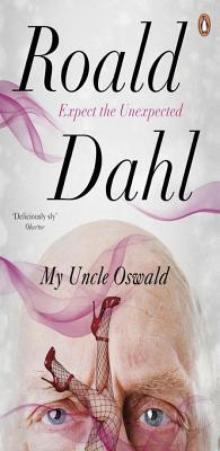 My Uncle Oswald
My Uncle Oswald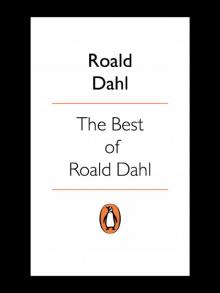 The Best of Roald Dahl
The Best of Roald Dahl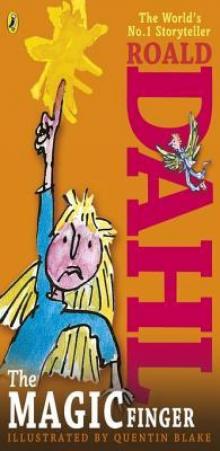 The Magic Finger
The Magic Finger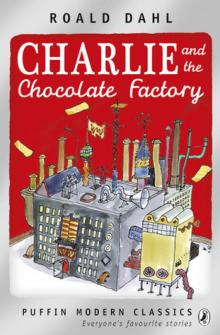 Charlie and the Chocolate Factory
Charlie and the Chocolate Factory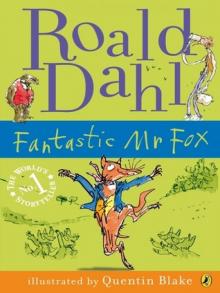 Fantastic Mr Fox
Fantastic Mr Fox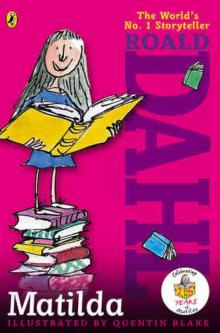 Matilda
Matilda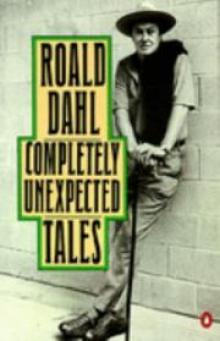 Completely Unexpected Tales: Tales of the Unexpected. More Tales of the Unexpected
Completely Unexpected Tales: Tales of the Unexpected. More Tales of the Unexpected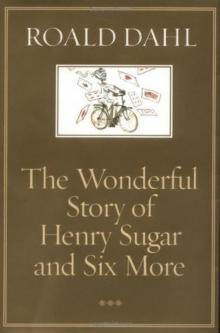 The Wonderful Story of Henry Sugar and Six More
The Wonderful Story of Henry Sugar and Six More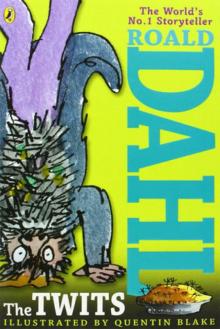 The Twits
The Twits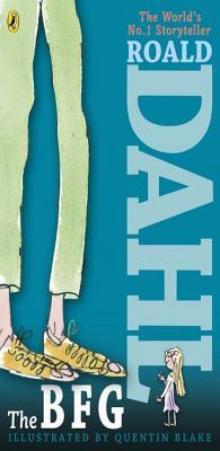 The BFG
The BFG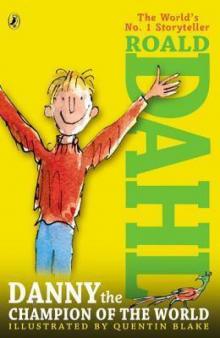 Danny the Champion of the World
Danny the Champion of the World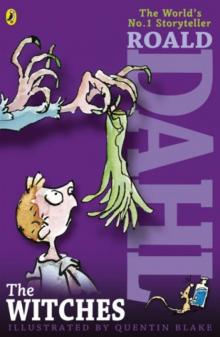 The Witches
The Witches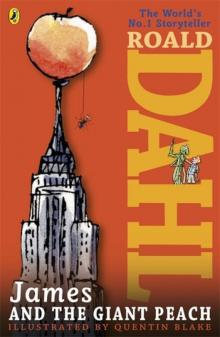 James and the Giant Peach
James and the Giant Peach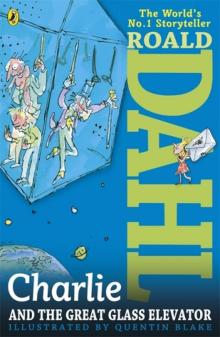 Charlie and the Great Glass Elevator
Charlie and the Great Glass Elevator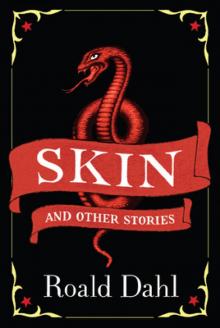 Skin and Other Stories
Skin and Other Stories Kiss Kiss
Kiss Kiss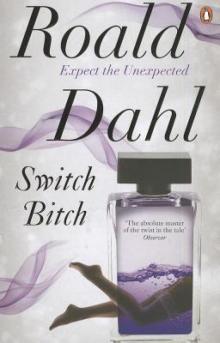 Switch Bitch
Switch Bitch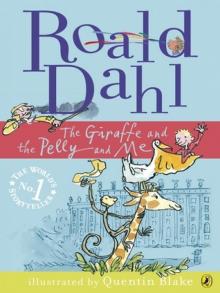 The Giraffe and the Pelly and Me
The Giraffe and the Pelly and Me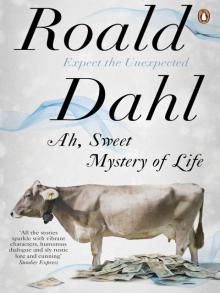 Ah, Sweet Mystery of Life
Ah, Sweet Mystery of Life Fear
Fear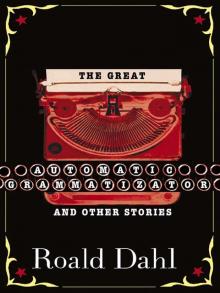 The Great Automatic Grammatizator and Other Stories
The Great Automatic Grammatizator and Other Stories Someone Like You
Someone Like You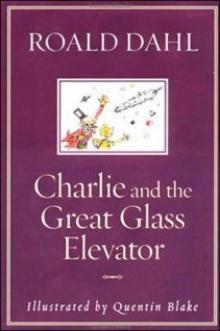 Charlie and the Great Glass Elevator c-2
Charlie and the Great Glass Elevator c-2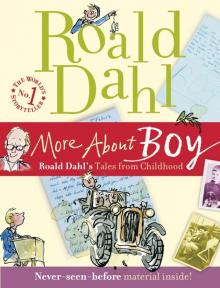 More About Boy
More About Boy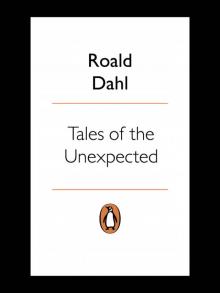 Tales of the Unexpected
Tales of the Unexpected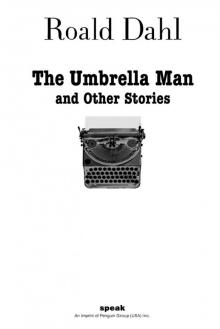 The Umbrella Man and Other Stories
The Umbrella Man and Other Stories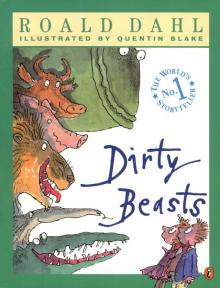 Dirty Beasts
Dirty Beasts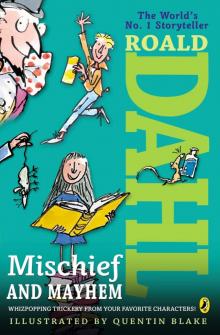 Roald Dahl's Mischief and Mayhem
Roald Dahl's Mischief and Mayhem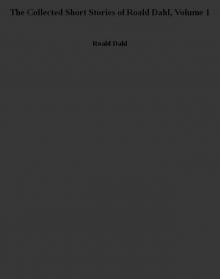 The Collected Short Stories of Roald Dahl, Volume 1
The Collected Short Stories of Roald Dahl, Volume 1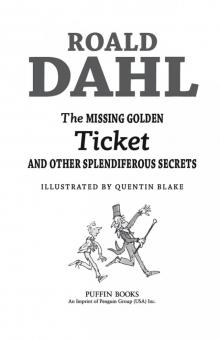 The Missing Golden Ticket and Other Splendiferous Secrets
The Missing Golden Ticket and Other Splendiferous Secrets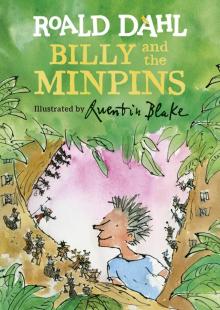 Billy and the Minpins
Billy and the Minpins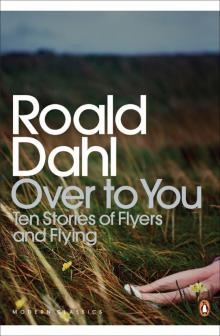 Over to You
Over to You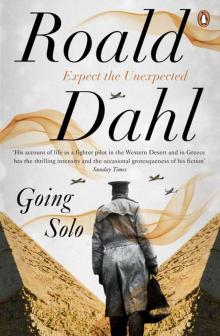 Going Solo
Going Solo Deception
Deception War
War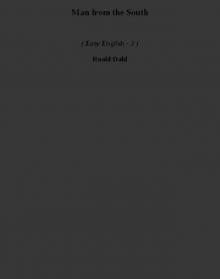 Man from the South ee-3
Man from the South ee-3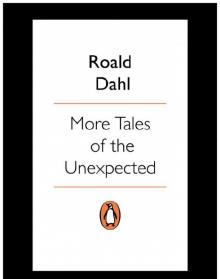 More Tales of the Unexpected
More Tales of the Unexpected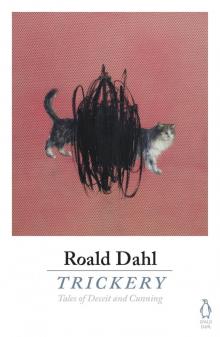 Trickery
Trickery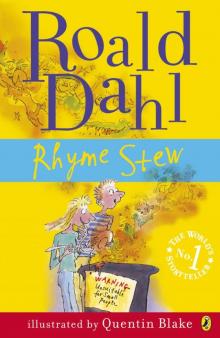 Rhyme Stew
Rhyme Stew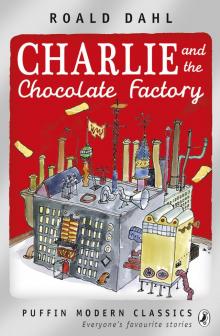 Charlie and the Chocolate Factory (Puffin Modern Classics relaunch)
Charlie and the Chocolate Factory (Puffin Modern Classics relaunch)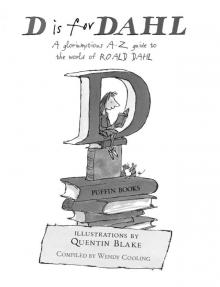 D is for Dahl
D is for Dahl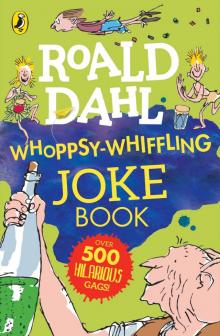 Roald Dahl Whoppsy-Whiffling Joke Book
Roald Dahl Whoppsy-Whiffling Joke Book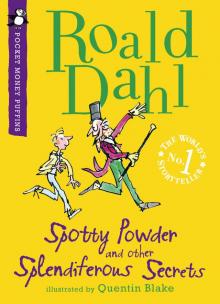 Spotty Powder and other Splendiferous Secrets
Spotty Powder and other Splendiferous Secrets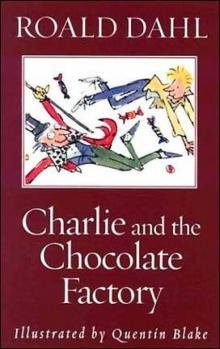 Charlie and the Chocolate Factory c-1
Charlie and the Chocolate Factory c-1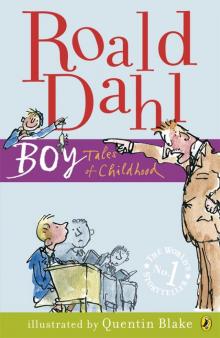 Boy
Boy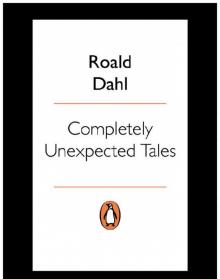 Completely Unexpected Tales
Completely Unexpected Tales Madness
Madness Innocence
Innocence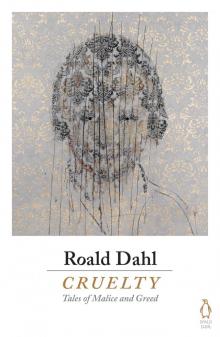 Cruelty
Cruelty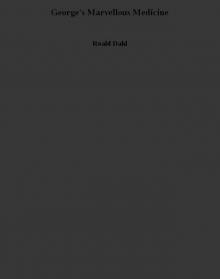 George's Marvellous Medicine
George's Marvellous Medicine